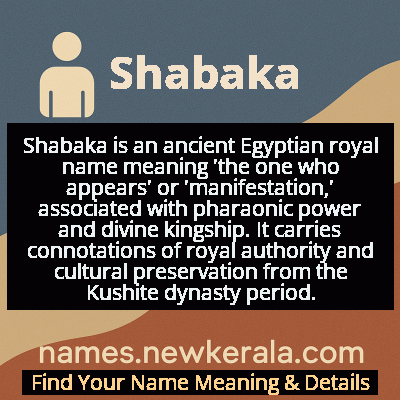Shabaka Name Meaning & Details
Origin, Popularity, Numerology Analysis & Name Meaning of Shabaka
Discover the origin, meaning, and cultural significance of the name SHABAKA. Delve into its historical roots and explore the lasting impact it has had on communities and traditions.
Name
Shabaka
Gender
Male
Origin
Egyptian
Lucky Number
7
Meaning of the Name - Shabaka
Shabaka is an ancient Egyptian royal name meaning 'the one who appears' or 'manifestation,' associated with pharaonic power and divine kingship. It carries connotations of royal authority and cultural preservation from the Kushite dynasty period.
Shabaka - Complete Numerology Analysis
Your Numerology Number
Based on Pythagorean Numerology System
Ruling Planet
Neptune (Ketu)
Positive Nature
Intuitive, analytical, spiritual, and inquisitive.
Negative Traits
Secretive, reserved, aloof, and can be overly critical.
Lucky Colours
Green, yellow.
Lucky Days
Monday.
Lucky Stones
Cat’s eye, moonstone.
Harmony Numbers
1, 5, 6.
Best Suited Professions
Scientists, researchers, spiritual leaders, detectives.
What People Like About You
Depth of knowledge, analytical skills, spirituality.
Famous People Named Shabaka
Shabaka
Pharaoh
Preserved ancient Egyptian religious texts including the Shabaka Stone
Shabaka I
Kushite King
Unified Egypt and Nubia under Kushite rule, founding the 25th Dynasty
Shabaka II
Meroitic Ruler
Maintained Nubian cultural traditions during Roman occupation period
Name Variations & International Equivalents
Click on blue names to explore their detailed meanings. Gray names with will be available soon.
Cultural & Historical Significance
This act demonstrated the Kushite rulers' deep reverence for Egyptian tradition despite their foreign origins, positioning themselves as protectors and restorers of ancient Egyptian culture during a period of political fragmentation. The name symbolizes the cultural synthesis between Nubian and Egyptian civilizations and represents a golden age of African pharaonic rule that connected the Nile Valley from modern Sudan to the Mediterranean. Shabaka's reign marked a significant chapter in African history where Nubian rulers not only conquered Egypt but actively preserved and celebrated its ancient heritage.
Extended Personality Analysis
Individuals named Shabaka are often perceived as possessing natural leadership qualities, carrying an air of authority and dignity that commands respect. They tend to be traditionalists with deep respect for history and cultural heritage, often serving as preservers of family or community traditions. Their personality typically combines strategic thinking with cultural sensitivity, enabling them to navigate complex social situations while maintaining their core values.
Shabakas are generally seen as reliable, responsible figures who take their commitments seriously and approach challenges with measured determination rather than impulsive action. They often exhibit a blend of quiet confidence and intellectual curiosity, preferring to lead through wisdom and example rather than overt displays of power. This combination of traits makes them effective in positions requiring cultural preservation, education, or community leadership where their natural gravitas and respect for tradition serve them well. Their approach to life tends to be methodical and principled, with a strong sense of duty to both past generations and future descendants.
Modern Usage & Popularity
In contemporary times, Shabaka remains a relatively rare but culturally significant name, primarily used within African diaspora communities, particularly among those with interest in pre-colonial African history. The name has seen a modest resurgence in recent decades as part of the broader movement toward reclaiming African cultural heritage and names. It is most commonly found in academic circles, among families with strong Pan-African consciousness, and in communities seeking to connect with ancient Nubian and Egyptian heritage. While not appearing on mainstream baby name charts, Shabaka maintains a steady presence as a meaningful choice for parents wanting to honor African royal traditions and instill a sense of historical pride in their children. The name is occasionally used in artistic and intellectual communities as a statement of cultural identity and historical awareness, particularly among those engaged in African studies or cultural preservation work.
Symbolic & Spiritual Meanings
Symbolically, Shabaka represents the enduring power of cultural preservation and the bridge between ancient and modern African identity. The name carries connotations of royal authority, spiritual guardianship, and the transmission of sacred knowledge across generations. It symbolizes the idea of the ruler as both protector and perpetuator of tradition, embodying the concept that true leadership involves safeguarding cultural heritage while guiding society forward. Metaphorically, Shabaka suggests the manifestation of divine will through earthly authority, reflecting the ancient Egyptian concept of ma'at (cosmic order and balance). The name also represents cultural synthesis and the ability to honor multiple traditions while maintaining one's core identity, making it a powerful symbol for multicultural leadership and the preservation of endangered knowledge systems in the face of historical change and cultural assimilation pressures.

